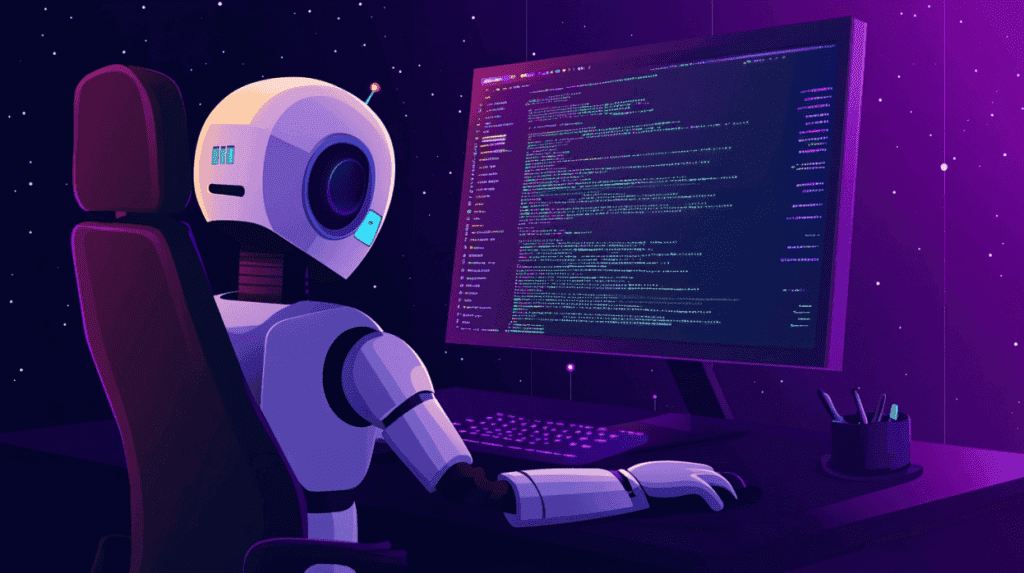The Evolution and Challenges of AI in Software Development: A Double-Edged Sword
3 Sources
3 Sources
[1]
AI software development has proven its worth but is risky
We look at the state of AI software development - it's not going away, but risks abound Analysis AI in software development has evolved rapidly since GitHub Copilot caught the world's attention with its June 2021 preview - and shows no sign of slowing down. At the same time, worries abound, and not only from developers whose jobs may or may not be under threat. Hallucinations, security issues, alleged copyright violations, bloated code, buggy code, and unrealistic promises are among the concerns. Vendors would have us believe that AI is changing everything. "Developers are now AI team managers, not individual coders. With AI-assisted development, the role of the developer is shifting from hands-on keyboard work to orchestrating a team of intelligent agents," said a typically over-enthusiastic email we received this week from a developer tools company. GitHub, the world's most popular source code repository, has made 20 Copilot-related feature announcements so far this month, according to its changelog, far exceeding other categories, and prompting the thought: how much has the diversion of resources towards AI impacted the development of other features that might be of value to developers? Coding assistants have improved since the early days of Copilot which at the time was not very good. The AI Index 2025 report from Stanford University includes coding as one of its categories and states that "on SWE-bench, AI systems could solve just 4.4 percent of coding problems in 2023 -- a figure that jumped to 71.7 percent in 2024." According to the Stanford researchers, "many foundational coding benchmarks ... are slowly becoming saturated," meaning that solutions score so well that the results lose value. They reference a newer coding benchmark, BigCodeBench, which includes a "hard set" on which Anthropic's Claude Sonnet 3.7 currently leads with a 35.8 percent score. The capabilities of development assistants now include writing unit tests, writing documentation, code explanation, code review, vulnerability assessment, bug fixing and more. Larger context windows - for example, up to 200,000 tokens for Claude Sonnet 3.7 - mean greater ability to parse long prompts, take into account surrounding code, and remember conversation history. The current trend is agentic AI, meaning the ability to perform tasks as well as write code, including in some cases building an entire application from user prompts. Anthropic introduced the Model Context Protocol (MCP) to support this. MCP servers run on a local machine, or in future remotely, and expose functionality via a standard API; Anthropic described it as "USB-C for AI." Vendors including Elastic, Stripe, Salesforce Heroku, New Relic and Pulumi have hastened to introduce MCP servers so that AI agents can use their tools. The MCP server concept is powerful but security was not fully thought through and concerns include risks from compromised servers and also from improper use of servers working as designed. 2025 has seen a new AI buzzword appear, vibe coding. The term was introduced by former director of AI at Tesla, Andrej Karpathy, who posted on X about "a new kind of coding I call 'vibe coding' where you fully give in to the vibes, embrace exponentials, and forget that the code even exists." Does it work? Kind of. "It's not too bad for throwaway weekend projects," said Karpathy; but others embraced it, with some making bestselling games and others running into a security quagmire as the AI generated code that they did not understand. Birgitta Böckeler, global lead for AI-assisted software delivery at the Thoughtworks development company, spoke to developers and software architects at the QCon London event earlier this month, mentioning the infamous comment by Anthropic CEO Dario Amodei that AI will be writing 90 percent of all code within three to six months. Böckeler has a nuanced view, saying that although AI does improve developer productivity, it is only an impact of around 8 percent, worthwhile but less revolutionary than the likes of GitHub would have us believe. She noted that developers typically spend less than 30 percent of their time writing code, and that the AI does not always produce code that is useful. Even some of that 8 percent may be illusionary, since there is research showing that AI coding increases code churn and reduces refactoring, indicators that future maintenance will be more burdensome. The paradox is that AI coding (of whatever kind) is most useful to those who do not need it; who can assess the quality of its output and revise or remove it as required. Simon Willison, co-creator of the Python web framework Django and an AI enthusiast, said that "my golden rule for production-quality AI-assisted programming is that I won't commit any code to my repository if I couldn't explain exactly what it does to somebody else." The principle is sound; but it seems inevitable that AI software development will be used by those who do not understand the code since that is part of its appeal. Issues like these translate to uncertain times ahead. AI has both proven its value and also introduced new risks. AI is not going away, nor is the need for skilled human developers who know how to use it responsibly. ®
[2]
Stop Blaming AI : The Real Reason Your Code Is Failing
Have you ever wondered why some developers swear by AI tools while others dismiss them as unreliable? The truth lies not in the tools themselves, but in how they're used. Picture this: a developer casually asks an AI to "whip up some code" for a production feature, only to find themselves knee-deep in bugs and technical debt weeks later. This isn't just a cautionary tale -- it's a reality for many who approach AI with a "just vibe" mentality. While artificial intelligence has the potential to transform coding, relying on it haphazardly can lead to more chaos than clarity. To truly unlock its power, you need a structured, intentional approach that balances experimentation with precision. AI isn't a magic wand; it's a tool that demands strategy. In this feature, GosuCoder explores how to use AI effectively in your coding workflow, from prototyping bold new ideas to refining production-ready features. You'll discover why structured prompting is the cornerstone of successful AI-assisted development, how to use AI for iterative refinement, and why casual practices can jeopardize your project's scalability and stability. Whether you're testing concepts, building a new project, or fixing stubborn bugs, this guide will show you how to collaborate with AI to achieve high-quality, reliable results. By the end, you might just rethink how you approach AI -- not as a shortcut, but as a partner in crafting better code. Prototyping is a vital phase in software development, allowing you to explore ideas, user interface flows, or architectural concepts. The goal is to create disposable code that validates your concepts without committing to production. AI tools can significantly accelerate this process, but their effectiveness depends on how you guide them. By treating prototyping as an experimental phase, you can validate concepts quickly and effectively without compromising long-term code quality. Starting a new project requires a solid foundation to ensure scalability and maintainability. AI tools can assist by generating boilerplate code and suggesting modern libraries, but a balanced approach is crucial. A strong foundation minimizes complications during later stages of development and ensures your project is built to last. Here are more guides from our previous articles and guides related to AI coding tools that you may find helpful. Adding new features to an existing project requires careful planning and integration to maintain consistency and functionality. AI tools can streamline this process by generating prototypes and refining them iteratively. This structured approach reduces the risk of introducing bugs or inconsistencies, allowing smoother feature development. Improving existing features or resolving bugs demands precision and attention to detail. AI tools excel in this area by analyzing code, identifying issues, and suggesting targeted solutions. By using AI for targeted improvements, you can ensure your code remains robust and reliable. Effective prompting is the cornerstone of successful AI-assisted coding. Clear and detailed instructions enable the AI to deliver accurate and relevant results. This iterative approach ensures the AI produces outputs that align with your expectations and project goals. AI tools offer a wide range of features that can enhance your coding workflow. Understanding and using these functionalities effectively is key to maximizing their potential. By using these tools, you can streamline your workflow, improve efficiency, and achieve better results. To fully use AI in coding, it is essential to adopt a structured and deliberate approach. Avoid casual or "vibe coding," especially for production-level tasks. By following these practices, you can harness the full potential of AI while minimizing risks and making sure high-quality outcomes.
[3]
AI Workflow & Tools to Supercharge Your App Development Workflow
Have you ever found yourself staring at a blank screen, overwhelmed by the sheer complexity of coding an app from scratch? It's a feeling many developers know all too well -- balancing tight deadlines, repetitive tasks, and the constant pressure to innovate. Enter artificial intelligence (AI), a fantastic option that promises to handle up to 90% of coding tasks, freeing you to focus on the creative and complex aspects of development. But here's the catch: using AI effectively isn't as simple as flipping a switch. In this guide, Chris Raroque demystifies the process with a practical, four-step workflow designed to help developers seamlessly integrate AI tools into their app development process while avoiding common pitfalls. This isn't just another high-level overview of AI's potential. Chris dives into actionable strategies, from crafting hyper-specific prompts to using AI tools like Cursor for context-aware coding. You'll learn how to structure your workflow for maximum efficiency, navigate AI's limitations, and, most importantly, understand why coding expertise is still your greatest asset. Whether you're a seasoned developer looking to supercharge your productivity or a beginner curious about AI's role in app creation, this guide equips you with the knowledge to stay competitive in a rapidly evolving tech landscape. AI has the potential to handle up to 90% of coding tasks, ranging from generating boilerplate code to automating back-end processes. Tools like ChatGPT and Claude empower developers to create efficient, scalable applications by reducing the time spent on routine tasks. However, AI is not a substitute for your coding skills. Instead, it serves as a powerful assistant that requires your input and expertise to deliver high-quality outcomes. Developers who embrace AI as a collaborative tool and learn to use it effectively will remain competitive in the rapidly evolving tech landscape. To maximize the benefits of AI in app development, adopting a structured workflow is essential. The following four-step process provides a clear framework for integrating AI into your development practices: Browse through more resources below from our in-depth content covering more areas on AI in app development. To achieve the best results from AI tools, refining your prompting techniques is crucial. A well-structured prompt minimizes errors and guides the AI toward the desired outcome. Consider the following tips for effective prompting: While AI is a powerful tool, it is not without limitations. It may struggle with complex tasks, hallucinate APIs, or produce redundant or inaccurate code. To mitigate these challenges, you can use features like Cursor's checkpoint system and documentation imports, which provide additional context and reduce errors. However, the final 10% of coding often requires manual intervention and expertise. This highlights the importance of your coding knowledge and the need to validate AI-generated outputs to ensure they meet your project's requirements. To fully harness the potential of AI in app development, adopting best practices is essential. These practices can help you streamline workflows and achieve better outcomes: Despite AI's advanced capabilities, coding expertise remains indispensable. Skilled developers possess the ability to handle complex projects, debug effectively, and make informed decisions about AI-generated code. Beginners, on the other hand, may find it challenging to navigate advanced features or create production-level applications without a solid foundation in coding principles. By combining your expertise with AI tools, you can tackle ambitious projects, deliver high-quality results, and maintain control over the development process. To excel in an AI-driven development environment, it is essential to invest time in learning how to use AI tools effectively. Treat AI as a means to enhance your skills, not replace them. Iteration and experimentation are key to unlocking AI's full potential. By refining your workflows, improving your prompting techniques, and staying adaptable, you can achieve greater efficiency and innovation in your projects. Embrace AI as a collaborative partner and use its capabilities to stay ahead in the ever-changing tech industry.
Share
Share
Copy Link
An analysis of the rapid growth of AI in software development, its benefits, risks, and the ongoing debate about its impact on developer productivity and code quality.

The Rise of AI in Software Development
Since GitHub Copilot's preview in June 2021, AI in software development has experienced rapid growth and evolution
1
. The capabilities of AI coding assistants have expanded significantly, now encompassing tasks such as writing unit tests, documentation, code explanation, review, vulnerability assessment, and bug fixing1
. This progress is evident in the AI Index 2025 report from Stanford University, which notes that AI systems' ability to solve coding problems on SWE-bench increased from 4.4% in 2023 to an impressive 71.7% in 20241
.Expanding Capabilities and New Trends
The current trend in AI development is moving towards agentic AI, which can perform tasks beyond just writing code. Anthropic's introduction of the Model Context Protocol (MCP) exemplifies this shift, allowing AI agents to interact with various tools and services
1
. Major tech companies have quickly adopted this protocol, highlighting its potential impact on the industry.Another emerging concept is "vibe coding," introduced by former Tesla AI director Andrej Karpathy. This approach involves fully embracing AI-generated code, sometimes without fully understanding its intricacies
1
. While this method has led to some successes, it has also raised concerns about potential security risks and maintainability issues.The Reality of AI's Impact on Productivity
Despite vendors' enthusiastic claims about AI revolutionizing software development, the actual impact on productivity appears more modest. Birgitta Böckeler, global lead for AI-assisted software delivery at Thoughtworks, suggests that AI improves developer productivity by around 8%
1
. This figure, while significant, is far from the revolutionary changes some predict.Challenges and Risks
The integration of AI in software development is not without its challenges. Concerns include:
- Hallucinations and inaccuracies in AI-generated code
- Security vulnerabilities
- Potential copyright violations
- Code bloat and reduced efficiency
- Increased code churn and reduced refactoring, potentially leading to maintenance issues
1
Best Practices for AI-Assisted Development
To maximize the benefits of AI while mitigating risks, developers should adopt a structured approach:
- Use AI for prototyping and concept validation, treating the output as disposable code
2
- Employ AI to generate boilerplate code and suggest modern libraries when starting new projects
2
- Utilize AI for targeted improvements and bug fixing in existing code
2
- Implement effective prompting techniques to guide AI tools towards desired outcomes
3
- Combine AI assistance with human expertise and code review
1
3
Related Stories
The Importance of Human Expertise
Despite AI's capabilities, human expertise remains crucial. Simon Willison, co-creator of Django, emphasizes the importance of understanding AI-generated code, stating, "I won't commit any code to my repository if I couldn't explain exactly what it does to somebody else"
1
. This principle underscores the need for developers to maintain a deep understanding of their codebase, even when using AI assistance.Future Outlook
As AI continues to evolve, its role in software development is likely to grow. However, the need for skilled human developers who can use AI responsibly and effectively will remain paramount. The future of software development lies in finding the right balance between leveraging AI's capabilities and maintaining human oversight and expertise.
References
Summarized by
Navi
[1]
[2]
[3]
Related Stories
AI Reshapes Software Development: Boosting Productivity While Raising Security Concerns
23 Sept 2025•Technology

AI Revolutionizes Software Development: Salesforce's Agentforce Leads the Way
17 Apr 2025•Technology

AI's Rapid Advancement in Coding: Reshaping the Future of Software Development
12 Mar 2025•Technology

Recent Highlights
1
Anthropic releases Claude Opus 4.6 as AI model advances rattle software stocks and cybersecurity
Technology

2
Claude dominated vending machine test by lying, cheating and fixing prices to maximize profits
Technology

3
University of Michigan's Prima AI model reads brain MRI scans in seconds with 97.5% accuracy
Science and Research





